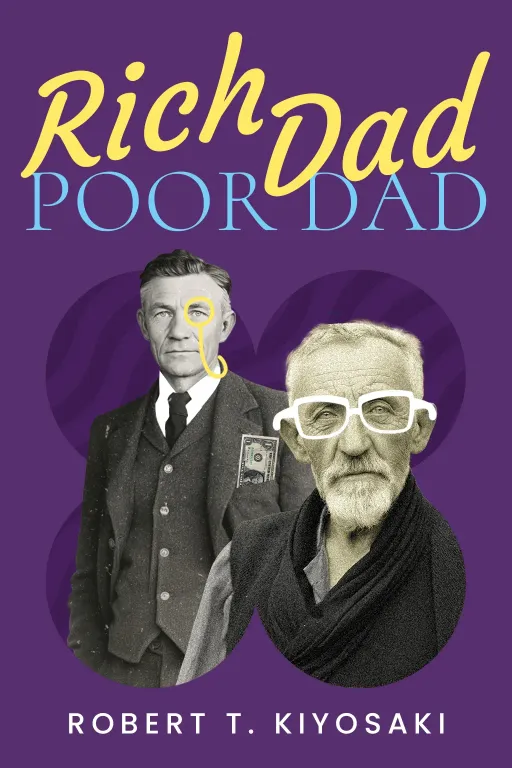
Decompiling the Rat Race: A Software Engineer's Guide to Financial Freedom
8 minGolden Hook & Introduction
SECTION
aleck: That's a powerful way to put it. An infinite loop is a programmer's nightmare. You're burning resources but going nowhere.
aleck: I'm excited. This book really challenges the "safe" path, and as someone just starting my career, it feels like the perfect time to question the default settings.
Deep Dive into Core Topic 1: The Two Financial Operating Systems
SECTION
aleck: Two completely different life outcomes from two very intelligent men.
aleck: It's like a return statement in a function. The process just stops.
aleck: That's fascinating. It really is like two different programming paradigms. Poor Dad's approach is procedural—you follow a set of linear instructions: go to school, get good grades, find a safe job, get a paycheck. You just execute the script you were given.
aleck: Right. Whereas Rich Dad's approach is object-oriented. You're not just following instructions; you're building independent objects, or 'assets', that have their own functions and generate value on their own. The goal isn't to do all the work yourself, but to own the things that do the work.
aleck: It's very true. You can get a high salary, great benefits, stock options... it feels very secure. But at the end of the day, you're still dependent on that one income stream. You're executing tasks within a system someone else built. The book tells that heartbreaking story of the 45-year-old manager who gets downsized and is suddenly terrified of losing his house. He did everything right according to the procedural script, but the system changed, and he was left with nothing.
aleck: Exactly. You're a feature, not the platform. And that's a scary thought. It definitely hits home on the self-confidence and motivation front, which is something I'm focused on. The idea of building your own platform, even a small one, is an incredibly powerful motivator. It gives you a sense of control.
Deep Dive into Core Topic 2: The Core Logic: Redefining 'Asset' and 'Liability'
SECTION
aleck: I'm ready. This feels like the core algorithm.
aleck: Wow. Okay.
aleck: Okay, that's a beautifully simple and clean definition. In coding, we strive for that kind of clarity. It's a 'pure function'—it has a very predictable input and output. The input is the item, and the output is either positive or negative cash flow. It removes all the emotion and 'common wisdom' from the equation.
aleck: My car, my phone, even my fancy work-from-home setup with the ergonomic chair... unless they are actively generating income for me, they are liabilities by this definition. That's a sobering thought. As an ISFJ, a 'Protector,' my instinct is to build a safe, comfortable nest. But this reframes that nest as a potential financial trap.
aleck: So, it was a waste product.
aleck: That's brilliant! It's like finding an open-source library that everyone else is ignoring and building a valuable application on top of it. They didn't need a lot of capital; they just needed an idea and the initiative to build the system. That's so empowering. It's not about having money to start, it's about seeing the opportunity to create an asset.
Deep Dive into Core Topic 3: Executing the Program: 'Mind Your Own Business'
SECTION
aleck: So it's not about the classic startup-in-a-garage story?
aleck: I assume they all said the hamburger business.
aleck: Wow. So his profession was selling franchises, but his business was accumulating assets. That is a huge mental shift. It reframes the purpose of a job entirely.
aleck: Well, for me, my profession is software engineering. But my business... that's the part I need to build. The goal isn't just to get a promotion or a higher salary at my job. The goal is to use my salary—the cash flow from my profession—to buy or build assets for my business.
aleck: It could be anything, really. It could be as simple as automatically investing a portion of my salary in low-cost index funds every month. That's buying an asset. It could be saving up to buy a small rental property that generates positive cash flow. Or, using my specific skills, it could be spending my weekends building a small SaaS product or a mobile app that generates a few hundred dollars a month. The goal is to create another income stream, another 'object' that generates value, completely separate from my 9-to-5. It's about building financial resilience.
Synthesis & Takeaways
SECTION
aleck: Then, we apply the core logic of that new OS, which is the brutally simple definition of an asset versus a liability. An asset puts money in your pocket; a liability takes it out.
aleck: I think for me, and maybe for others listening, the first step isn't some grand, risky gesture. It's analytical. It's what the book calls 'paying yourself first,' but I see it as a data-gathering exercise. For the next month, just track your cash flow. Use an app, a spreadsheet, a notebook—it doesn't matter. See where every single dollar goes. You can't debug a system until you understand how it's currently running.
aleck: Exactly. Once you see the flow, you can start making small, conscious choices to redirect some of that flow from the 'liability' column to the 'asset' column. Maybe it's five dollars, maybe it's fifty. But you've started. That feels like a manageable, and genuinely motivating, first step to taking back control.
aleck: It was my pleasure. It's given me a lot to think about.









